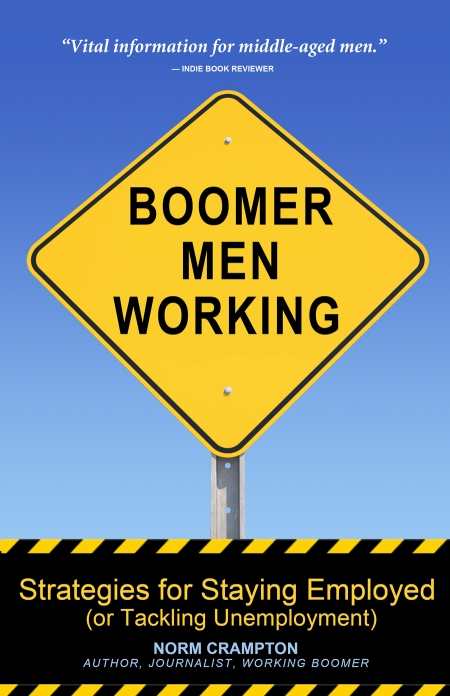
Boomer Men Working
Strategies for Staying Employed (or Tackling Unemployment)
The long-term impact of the recession that started in 2008 continues to be felt by millions of Americans, but among the hardest hit were men of the “Boomer” generation (born between 1946 and 1964). The recession, writes journalist Norm Crampton in his book Boomer Men Working, “was much worse for older men than in any previous recession—three out of four terminations were of men.”
Crampton focuses specifically on the employment challenges facing Boomer men who want to remain secure in their present job, or who are looking for work. The author doesn’t sugarcoat the vulnerability of the older worker, but he does offer sensible, practical advice, packaged in an easy-to-read volume that is well-balanced between how-to tips and real stories of Boomer-age and older men.
Crampton begins by laying out a potential ten-year plan for employment, observing that it is the “non-routine” jobs that are the “safest,” whether they are high-skilled (doctors, lawyers, and professors, for example), or low-to-medium-skilled (such as cooks, plumbers, and taxi drivers). He then moves into an exploration of the team-oriented work environment to demonstrate the growing importance of collaboration, followed by a discussion of “what to do between jobs,” a particularly helpful chapter for men who have been laid off and are feeling helpless.
Crampton covers the expected material, such as how to look for a job, how to develop an effective resume, how to handle interview questions, and how to work with younger employees, but he adds extra value to each component. In the chapter about doing a job search, for example, the author includes authoritative advice about how to make the best use of the business/professional social media network LinkedIn in looking for work.
Crampton’s final chapter is an uncomplicated discussion of decisions facing Boomer men with regard to Social Security and Medicare, and, in particular, when to begin to take Social Security payments. While Crampton just scratches the surface here, he raises important questions that readers need to consider carefully.
Of particular interest in Boomer Men Working are the brief stories Crampton collected from men who share their own worklife experiences. It should be heartening for readers to learn about people like Jack Slotnick, who at age eighty-six is working towards a master’s degree in clinical psychology so he can begin a new career—counseling veterans.
Boomer men who want or need to work should find plenty of inspiration, along with useful material they can put to good use in their job search.
Reviewed by
Barry Silverstein
Disclosure: This article is not an endorsement, but a review. The publisher of this book provided free copies of the book and paid a small fee to have their book reviewed by a professional reviewer. Foreword Reviews and Clarion Reviews make no guarantee that the publisher will receive a positive review. Foreword Magazine, Inc. is disclosing this in accordance with the Federal Trade Commission’s 16 CFR, Part 255.
